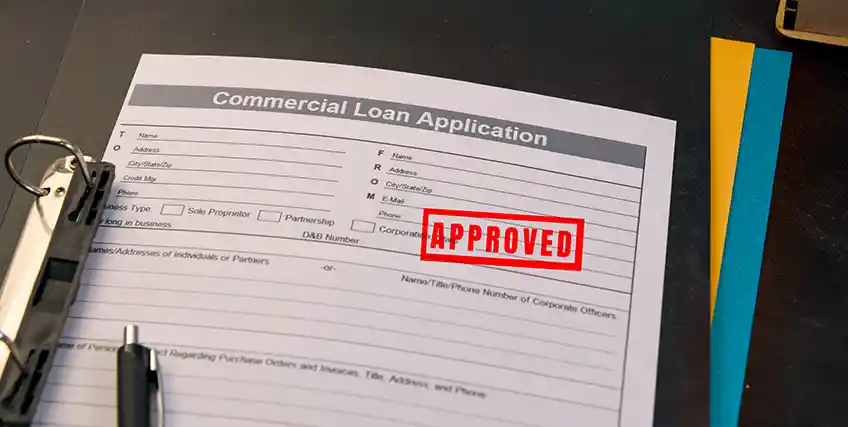Right Business Loan
to Fuel Your Next Big Move
Looking for Business Financing?
Apply now for flexible business financing. Biz2Credit offers term loans, revenue-based financing, lines of credit, and commercial real estate loans to qualified businesses.
Set up a Biz2Credit account and apply for business financing.
Securing the right business loan can be the turning point for any small business. Whether you're launching a startup or expanding operations, the right financing opens doors to growth, inventory, equipment, or even hiring new talent.
In today's lending landscape, there are more options than ever. From new business loans for first-time entrepreneurs to tailored programs that offer the best business loans for small businesses, choosing the right fit depends on your goals, credit, and stage of business.
This guide breaks down your top options, explains how to qualify, and helps you understand what lenders look for. Whether you're looking for a business loan for new business purposes or considering refinancing your existing debt, understanding how business loans for small business work can set your company on the right track.
We'll also explore interest rates, loan terms, the role of credit scores, and how to prepare a strong loan application. Let's get your business funded with clarity and confidence.
What is a Business Loan?
A business loan is a lump sum or line of credit provided by a financial institution to help fund business expenses. These can include working capital, equipment purchases, hiring, or even buying real estate. Unlike personal loans, they're specifically tailored for businesses based on your business credit profile and revenue.
Lenders offer a variety of business loans for small business owners, including SBA-backed options, term loans, and new business loans. Each comes with unique repayment terms, interest rates, and eligibility requirements. Some loans are short-term, helping with cash flow gaps. Others, like commercial real estate loans, span years.
Best business loans often come with competitive interest rates, longer terms, and lower fees but qualifying for them may require strong credit and detailed documentation. For a business loan for new business, factors like your business plan, projections, and industry experience weigh more heavily.
The U.S. Small Business Administration (SBA) plays a key role in supporting small businesses by guaranteeing loans, making it easier for financial institutions to lend to riskier profiles.
In short, business loans are not one-size-fits-all. Understanding which type suits your small business financing needs is critical to success.
Types of Small Business Loans
There's no one-size-fits-all when it comes to funding. Here are some common types of business loans that small businesses can explore:
01 Term Loans
A term loan provides a lump sum of capital with a fixed repayment schedule. These are among the most widely used business loans for predictable, long-term investments. They're often used for inventory, hiring, or expanding to a second location.
Term loans are especially suitable for businesses with stable revenue. They typically offer fixed or variable interest rates, and repayment terms can range from 1 to 10 years.
Although not always the first choice for new business loans, they remain a solid option for entrepreneurs with good credit and a proven track record. They rank among the best business loans for growth.
02 Business Lines of Credit
A business line of credit is a revolving form of financing. It allows business owners to borrow as needed up to a preset limit and pay interest only on the amount used.
It's best for short-term needs like payroll, seasonal dips, or unexpected repairs. This flexibility makes it one of the most useful business loans for small business owners.
While it may not be the go-to business loan for new business startups, it's invaluable once cash flow stabilizes. Many lenders consider it part of their best business loans portfolio.
03 Equipment Financing
Equipment financing helps businesses purchase machinery, vehicles, or technology without upfront capital. The equipment itself acts as collateral, reducing lender risk.
These business loans are often easier to qualify. For startups, this is a great option because it preserves working capital. Many new business loans fall into this category since the asset secures the loan. It's considered one of the best business loans for small businesses that rely on specialized tools or heavy equipment.
04 Working Capital Loans
Working capital loans are short-term business loans that help cover operational costs like rent, inventory, and payroll. They're not used for long-term investments but are critical during cash flow gaps.
Ideal for seasonal businesses, these loans keep daily operations running smoothly. Many new business loans are structured this way since they provide fast, flexible funding.
Because of their accessibility and speed, they're often listed among the best business loans for immediate needs.
05 Microloans
Microloans are small-dollar business loans, typically under $50,000, often offered by nonprofit organizations or community lenders. They're designed to support startups, minority-owned businesses, or entrepreneurs with limited credit.
These loans are ideal for new business owners with limited financing options. They may include additional benefits like mentorship or business training.
Though smaller in size, they are powerful for establishing credit history. As such, they're a popular business loan for new business needs and early-stage cash flow.
06 Commercial Real Estate Loans
These business loans help entrepreneurs buy or renovate commercial property. They're typically secured by the property being financed, which can result in lower interest rates and longer repayment terms.
For businesses ready to purchase office space, storefronts, or warehouses, these loans are essential. They're also useful for refinancing existing real estate debt.
Among the best business loans for small businesses, they allow you to build equity in physical assets over time. These are usually available through both banks and SBA-backed lenders.
07 Startup Loans
Startup loans are built for companies with less than two years in operation. Since many startups don't have credit histories, lenders assess the owner's personal credit and business plan.
These loans often come with higher interest rates, but they provide essential capital for launching operations, hiring, or buying inventory.
Many new business loans fall under this category, particularly from online lenders and nonprofit institutions. Finding the best business loans for small businesses at the startup stage requires careful comparison of fees, terms, and conditions.
08 SBA Loans
SBA loans are among the most trusted forms of business loans. These are partially guaranteed by the U.S. Small Business Administration, making them a lower-risk option for lenders. The two most common SBA loan programs are the SBA 7(a) and 504 loans.
They offer long repayment terms - up to 25 years for real estate - and some of the lowest interest rates available. These loans support various needs such as working capital, refinancing, or equipment purchase.
They're ideal for new business loans as well as for established companies seeking the best business loans for small businesses. However, the application process can be time-consuming and requires strong financial documentation.
How Do I Qualify for a Business Loan?
Qualifying for a loan depends on several core factors that lenders review during underwriting:
Credit Score
Both personal and business credit scores affect eligibility. A score above 680 increases access to best business loans, but lenders may consider lower scores for certain programs.
Annual Revenue
Your revenue history helps lenders assess repayment capacity. For business loans for small business, most lenders prefer annual revenue above $100,000.
Time in Business
The longer you've been operating, the better. Businesses over two years old are seen as less risky. New business loans typically require extra documentation and a strong business plan.
Debt-to-Income Ratio
A manageable debt load improves your chances. Lenders want assurance that repayment won't strain your cash flow or lead to missed payments.
How to Improve Chances of Getting a Small Business Loan
Boost your approval odds with these practical steps:
Strengthen Your Credit
Pay off outstanding debts and keep credit utilization low. Higher scores open doors to the best business loans for small businesses.
Build a Solid Business Plan
Outline your strategy, financials, market potential, and goals. This is crucial when applying for business loan for new business ventures.
Prepare Detailed Financials
Lenders want to see bank statements, tax returns, cash flow reports, and balance sheets. Accuracy builds credibility and speeds up approvals.
Reduce Existing Debt
Lower your liabilities before applying. A leaner debt profile makes you more attractive to financial institutions offering small business financing.
Choose the Right Loan Product
Not all business loans are equal. Match the loan to your needs-don't apply for a real estate loan if you need working capital.
Consider a Co-Signer or Collateral
If your credit is limited, adding a guarantor or collateral can strengthen your application and help you access new business loans.
Quick Checklist for Your Small Business Loan Application
Where to Get a Small Business Loan?
Banks and Credit Unions
Traditional institutions offer competitive rates, especially for established businesses. However, requirements are often stricter.
SBA-Backed Lenders
They offer government-backed business loans, with lower interest and longer repayment terms. These are ideal for new business loans with limited credit.
Online Lenders
Known for faster approvals, online platforms can provide the best business loans when time is a priority—especially for small business owners needing quick funds.
Community Development Financial Institutions (CDFIs)
Great for new business owners, these nonprofit lenders focus on underserved areas and often have more flexible eligibility requirements.
Trusted by Thousands of Small Business Owners in America.**
Simply because we get what you go through to build a business you believe in.
**Disclaimer: All stories are real, as told by real business owners. Customers do not receive monetary compensation for telling their stories.
From One Entrepreneur to Another: We Get You
We understand what's behind building a business you believe in.
All stories are real, as told by real business owners. Customers do not receive monetary compensation for telling their stories.



Business Loans Articles
How Credit Scores Impact Startup Business Loans and What Founders Can Do About It
Everyone dreamed of starting a business once in their life. But only some of them were...
Complete Guide to Small Business Refinance Loans
Small business owners often feel financial stress in the initial years of operations.
Things to Consider Before Filling Online Loan Application
Online loan applications have become one of the most convenient ways for business...
Applying for a Small Business Loan? Consider These 10 Things Before Making a Decision
Small businesses are often the pillars of the economy. Nearly every individual thinks of...
Steps to Prepare for Your First Time Business Loan Application
The initial stages of any entrepreneurial journey require more than just determination.
Small Business Owners Share Best Strategies to Compete with Big Box Retailers
One of the oldest and most common roadblocks for small retailers has been how to compete...
The Role of Business Impact Analysis in Financial Risk Management
In today’s competitive scenario, owning a small business is surely rewarding.
Funding a Small Business: Smart Ways to Grow Without Losing Control
For small businesses, managing cashflow can be a hassle in tough times. Business owners may approach...
Understanding Mortgage Rates: What is the Interest Rate Today?
For 15–30-year mortgages and adjustable-rate mortgages, the mortgage rates vary depending on the lender.
Frequently Asked Questions on Business Loan
1. What’s the easiest way to qualify for business loans?
Start with improving your credit score and documenting your revenue. Many lenders look for businesses earning at least $100,000 annually. New business loans may rely more on your plan.
2. Can I get a business loan with bad credit?
There are lenders who may offer you a business loan, but your options may be limited. Look for lenders offering business loans for small business owners with flexible terms or consider a secured loan.
3. Are SBA loans the best business loans available?
They often offer the lowest interest rates and longest terms. However, approval takes time, and not all borrowers meet the strict requirements. Each individual business should carefully decide whether this type of financing is best for their business or not.
4. Do business loans affect personal credit?
If personally guaranteed, yes. Most new business loans require a personal guarantee, especially if your business credit is limited.
5. What’s the difference between a line of credit and a term loan?
Lines of credit offer revolving access; term loans give a lump sum. Both are common financing options for different business needs.









